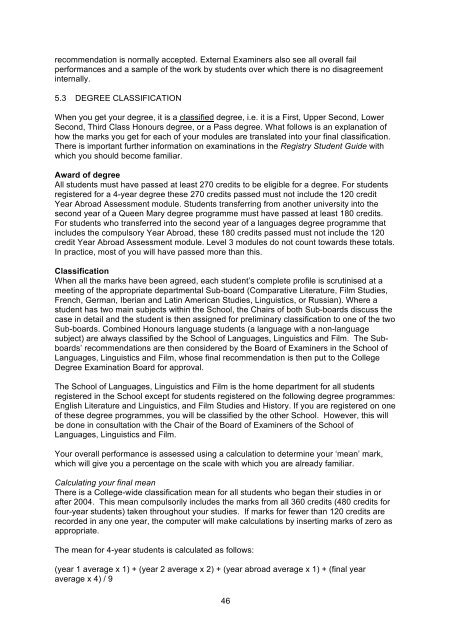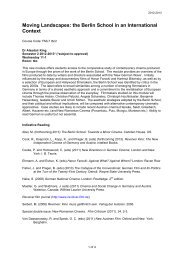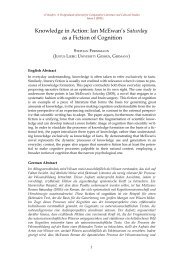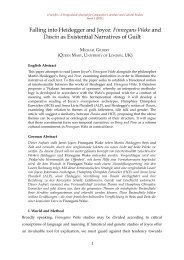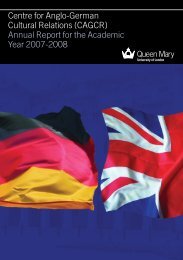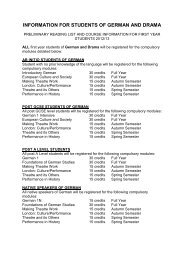Student Handbook - The School of Language, Linguistics and Film
Student Handbook - The School of Language, Linguistics and Film
Student Handbook - The School of Language, Linguistics and Film
You also want an ePaper? Increase the reach of your titles
YUMPU automatically turns print PDFs into web optimized ePapers that Google loves.
ecommendation is normally accepted. External Examiners also see all overall fail<br />
performances <strong>and</strong> a sample <strong>of</strong> the work by students over which there is no disagreement<br />
internally.<br />
5.3 DEGREE CLASSIFICATION<br />
When you get your degree, it is a classified degree, i.e. it is a First, Upper Second, Lower<br />
Second, Third Class Honours degree, or a Pass degree. What follows is an explanation <strong>of</strong><br />
how the marks you get for each <strong>of</strong> your modules are translated into your final classification.<br />
<strong>The</strong>re is important further information on examinations in the Registry <strong>Student</strong> Guide with<br />
which you should become familiar.<br />
Award <strong>of</strong> degree<br />
All students must have passed at least 270 credits to be eligible for a degree. For students<br />
registered for a 4-year degree these 270 credits passed must not include the 120 credit<br />
Year Abroad Assessment module. <strong>Student</strong>s transferring from another university into the<br />
second year <strong>of</strong> a Queen Mary degree programme must have passed at least 180 credits.<br />
For students who transferred into the second year <strong>of</strong> a languages degree programme that<br />
includes the compulsory Year Abroad, these 180 credits passed must not include the 120<br />
credit Year Abroad Assessment module. Level 3 modules do not count towards these totals.<br />
In practice, most <strong>of</strong> you will have passed more than this.<br />
Classification<br />
When all the marks have been agreed, each student’s complete pr<strong>of</strong>ile is scrutinised at a<br />
meeting <strong>of</strong> the appropriate departmental Sub-board (Comparative Literature, <strong>Film</strong> Studies,<br />
French, German, Iberian <strong>and</strong> Latin American Studies, <strong>Linguistics</strong>, or Russian). Where a<br />
student has two main subjects within the <strong>School</strong>, the Chairs <strong>of</strong> both Sub-boards discuss the<br />
case in detail <strong>and</strong> the student is then assigned for preliminary classification to one <strong>of</strong> the two<br />
Sub-boards. Combined Honours language students (a language with a non-language<br />
subject) are always classified by the <strong>School</strong> <strong>of</strong> <strong>Language</strong>s, <strong>Linguistics</strong> <strong>and</strong> <strong>Film</strong>. <strong>The</strong> Subboards’<br />
recommendations are then considered by the Board <strong>of</strong> Examiners in the <strong>School</strong> <strong>of</strong><br />
<strong>Language</strong>s, <strong>Linguistics</strong> <strong>and</strong> <strong>Film</strong>, whose final recommendation is then put to the College<br />
Degree Examination Board for approval.<br />
<strong>The</strong> <strong>School</strong> <strong>of</strong> <strong>Language</strong>s, <strong>Linguistics</strong> <strong>and</strong> <strong>Film</strong> is the home department for all students<br />
registered in the <strong>School</strong> except for students registered on the following degree programmes:<br />
English Literature <strong>and</strong> <strong>Linguistics</strong>, <strong>and</strong> <strong>Film</strong> Studies <strong>and</strong> History. If you are registered on one<br />
<strong>of</strong> these degree programmes, you will be classified by the other <strong>School</strong>. However, this will<br />
be done in consultation with the Chair <strong>of</strong> the Board <strong>of</strong> Examiners <strong>of</strong> the <strong>School</strong> <strong>of</strong><br />
<strong>Language</strong>s, <strong>Linguistics</strong> <strong>and</strong> <strong>Film</strong>.<br />
Your overall performance is assessed using a calculation to determine your ‘mean’ mark,<br />
which will give you a percentage on the scale with which you are already familiar.<br />
Calculating your final mean<br />
<strong>The</strong>re is a College-wide classification mean for all students who began their studies in or<br />
after 2004. This mean compulsorily includes the marks from all 360 credits (480 credits for<br />
four-year students) taken throughout your studies. If marks for fewer than 120 credits are<br />
recorded in any one year, the computer will make calculations by inserting marks <strong>of</strong> zero as<br />
appropriate.<br />
<strong>The</strong> mean for 4-year students is calculated as follows:<br />
(year 1 average x 1) + (year 2 average x 2) + (year abroad average x 1) + (final year<br />
average x 4) / 9<br />
46


